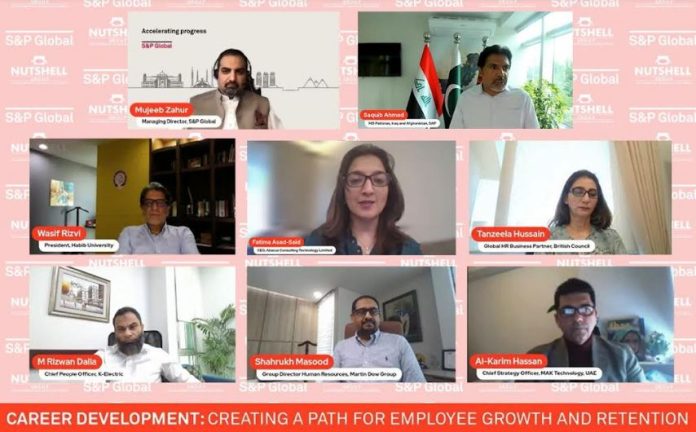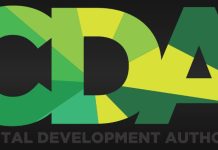DNA
ISLAMABAD, APR 7: S&P Global, in collaboration with Nutshell Group, held a webinar on ‘Career Development: Creating a Path for Employee Growth and Retention,’ recently.
Leading corporate executives and HR experts examined the impact of technological advancements and organizational changes on workplace relationships. The discussion revolved around the ideal culture of a workplace that is continuously evolving, making it critical for organizations to redesign and re-think their work structures to retain their best talent.
In his opening remarks, Mujeeb Zahur, Managing Director, S&P Global, said; “We at S&P Global spend our energies on developing clear goals, embracing continuous learning, networking strategically, seeking feedback, and proactively developing leadership skills across the team.”
Mujeeb further stated that S&P Global has won many awards including Best Place to Work in 2019, Gold Award Top IT Exporter 2016-2018, Platinum Award BPO Services 2019, and Silver Award in Top IT Exporter 2019. These awards have helped in the evolution of the company as a people-centric organization. Mujeeb added; “S&P Global is also taking part in Corporate Responsibility, and Diversity, Equity, and Inclusion (DEI) Initiatives, that include training of the female workforce. Under the Million Women Mentorship (MWM) program in collaboration with U.S.-Pakistan Women’s Council, we have trained over 15,400 women for various STEM-related skills. Our target is to train 20,000 women and we hope to achieve it soon.” Talking of technologies, Mujeeb mentioned S&P Global’s platform ‘Edge’ as a new venue for our team members. Edge offers enterprise learning to the team, offering courses ranging from personal and professional skills to industry hot topics and people leader development programs.
The webinar opened many perspectives of looking at the increasing need for retention and growth and how closely it is linked to leadership dynamics. Saquib Ahmad, Managing Director Pakistan, Iraq, and Afghanistan, SAP, emphasized the role of leadership, saying; “The overall phenomenon around workplaces has changed, and the employees know exactly what to demand from the organization they wish to work for.” He also insisted on a conducive ecosystem to retain talent and reduce the brain drain in Pakistan.
A dialogue on the theme of the webinar followed, moderated by Al-Karim Hassan, Chief Strategy Officer, MAK Technology, UAE. Esteemed panelists included Wasif Rizvi, President, Habib University; Fatima Asad-Said, Chief Executive Officer, Abacus Consulting Technology Limited; Tanzeela Hussain, Global HR Business Partner, British Council; Muhammad Rizwan Dalia, Chief People Officer, K-Electric; and Shahrukh Masood, Group Director Human Resources & Corporate Communication, Martin Dow Group.
Al-Karim initiated the dialogue with a profound statement on the new working modalities; “Not everyone can get promoted, but everyone can grow.” He mentioned how longevity at one organization was considered an important hallmark of a successful career, but now organizations are pushing their employees to gain experience from more than one employer, as they believe in upskilling and reskilling talent to fuel growth in the future.
Talking about employee retention practices, Wasif commented; “Apart from work-life balance, growth, encouragement, and good communication, the fundamental differentiating factor that ensures employee retention is the shared sense of purpose.” This, he felt, was a clear difference between a successful and an average organization.
Fatima spoke about the challenge to ensure opportunities for human capital and to add value in terms of employability. She felt that the human factor still rules, and relevance will impact sustainability and productivity most significantly. Talking of changed dynamics, she stated, “The conventional hierarchical reporting lines have been replaced by cross-functional teams, and the demographic shift now has five generations working within one organization.” These, she felt, were true challenges for the new leadership.
Commenting on what the future holds in terms of career development, Tanzeela said, “The onus is now on the organizations as to how they harness potential talent and invest in developing their skills. The war of talent is still on, so ‘up-skilling’ and ‘right-skilling’ are imperative.” She further reiterated the need for shared purpose and values as it creates relevance.
Rizwan spoke about the 3 Ps of Play, Purpose, and Potential, and how they contribute towards the sustainability of the institutional model for employees as well as companies. He also insisted on the role of the line manager to ensure his team’s retention and growth.
Shahrukh reflected on the changed value system of the new generation; “Earlier, people joined organizations, committing to staying for a decade and a half, and go through several designations within the same organization, but now the situation has changed and growth is viewed differently. This generation wants immediate results; they want a place where they feel heard and appreciated.”
In the concluding round, Wasif highlighted the fact that universities are the oldest surviving institutions, and they have many practices that can be copied by the corporates of today, in terms of DEI. He especially mentioned how, for the same reason, the tech giants like Google have renamed their workspaces as campuses. Fatima highlighted the importance of critical thinking and empathy, while Tanzeela reinforced the value of DEI at the workplace. Rizwan focused on the potential of employees to drive change and manage stakeholders whereas Shahrukh elaborated on the benefit of transparency and connectivity with employees. The Webinar was a great success, with valuable inputs and thoughts coming in from all speakers and panelists, and was attended live in 11 countries across the globe.

















